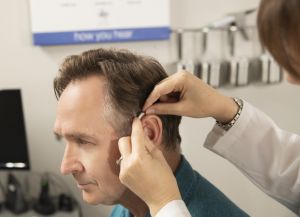|
www.HealthyHearing.com |
Hearing aids and tax timeGood news: Hearing aids are a deductible medical expense
Contributed by Debbie Clason, staff writer, Healthy Hearing Key points:
Good news: Many of your medical expenses are considered eligible deductions by the federal government. Since hearing loss is considered a medical condition and hearing aids are medical devices regulated by the FDA, you may be able to deduct these costs. 
deductible. Are hearing aids tax deductible?Yes. According to the IRS, hearing aids are considered a deductible medical expense, provided you were not compensated by insurance to pay for them. This is good news considering hearing aids can cost up to $6,000 and are not often covered by insurance. Other deductible medical expensesThey provide detailed information regarding deductions for medical and dental expenses, but here is a partial list for 2024-2025:
How much can you deduct?You can only deduct the amount of the total that exceeds 7.5% of your adjusted gross income. For example, if your adjusted gross income is $50,000, you can deduct the cost of any allowable medical expenses that exceed $3,750. You can calculate the amount you're allowed to take on Schedule A (Form 1040 or 1040-SR). Allowable deductions for hearing lossIn the case of hearing loss, allowable deductions include any payments you made for your diagnosis and treatment, which include what you paid for your hearing aids. While that may not add up to much by itself, it may be a significant factor when combined with your family’s other medical and dental expenses. Additionally, you also may be able to deduct the costs for transportation associated with your hearing loss, including actual fares for taxi, bus, train and ambulance rides. If you don’t use public transportation, the actual out-of-pocket expenses you incurred for your personal vehicle are deductible, such as gas, oil and mileage, tolls and parking — but only as they directly relate to your qualifying medical expenses. Keep receipts and recordsObviously, this process requires that you’ve kept good records and receipts for things that probably didn’t seem important at the time—like bus fare and trips to the gas station. If you didn’t keep all of the receipts necessary to take full advantage of these medical deductions this year but think itemizing may be beneficial, you’ll want to make a plan for tracking these expenses next year. Health spending medical accountsIf you don’t have enough deductions to make itemizing worth your while, it may be beneficial to use pre-tax dollars to help pay for hearing aids. Check with your employer to see if they offer health spending medical accounts (HSA), also known as Flex Spending Accounts (FSA), Medical Savings Accounts and Health Reimbursement Arrangements. HSAs are pre-tax benefit accounts you put money into to pay for out-of-pocket health care costs such as co-payments, deductibles, some drugs and other health care costs. Contributions for eligible participants range from $3,550 for an individual to $7,100 for families and vary depending upon the type of coverage you have, the date you become eligible and the date you cease being eligible. Contributions for FSAs are $2,700 each year and must be spent by the end of the plan year or forfeited. (Because this information changes often, always double-check with the IRS.) Can I pay for hearing aids with my pre-tax HSA funds?Yes. Hearing aids are an allowable medical expense for health spending accounts. Although your contribution may not cover the entire cost of your hearing aid purchase, it will help. If you’ve already purchased hearing aids, you can use health savings account funds to cover the costs of any repairs and maintenance as well as batteries you’ve purchased to operate them. Free tax assistance is availableThe IRS is the largest accounting and tax-collection organization in the world, with in excess of 480 forms posted on their website and more employees than the FBI. It’s estimated one million accountants are hired each year just to help Americans with their taxes. If you have additional questions about itemizing or qualifying medical expenses, the IRS offers free assistance online, over the telephone or in person at IRS Taxpayer Assistance Centers. Debbie Clason, staff writer, Healthy Hearing
|
Featured clinics near me
Earzlink Hearing Care - Reynoldsburg
7668 Slate Ridge Blvd
Reynoldsburg, OH 43068

Find a clinic
Need a hearing test but not sure which clinic to choose?
Call 1-877-872-7165 for help setting up a hearing test appointment.


 Debbie Clason holds a master's degree from Indiana University. Her impressive client list includes financial institutions, real estate developers, physicians, pharmacists and nonprofit organizations.
Debbie Clason holds a master's degree from Indiana University. Her impressive client list includes financial institutions, real estate developers, physicians, pharmacists and nonprofit organizations.